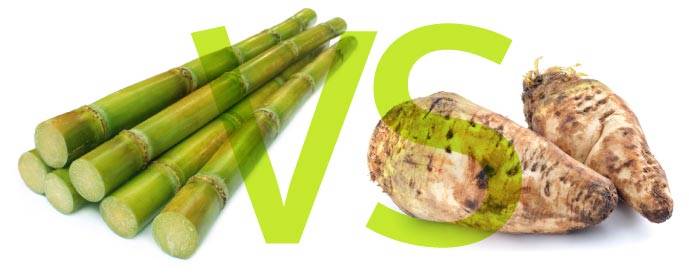A Thorough Introduction of the Health And Wellness and Economic Effects of Walking Stick Sugar Handling on Local Areas
Walking cane sugar handling plays an essential function in shaping the economic landscape of local areas, supplying employment chances and stimulating ancillary sectors. The health implications linked with high sugar consumption can not be overlooked, as they contribute to rising rates of obesity and diabetes mellitus.
Economic Benefits of Walking Cane Sugar Handling
Walking stick sugar processing offers significant economic advantages that extend past the prompt farming market. The cultivation and handling of sugarcane create various work chances, from farming to manufacturing and circulation. This work generation not only sustains local economies however likewise cultivates community advancement by offering secure income sources for households.
Furthermore, the sugar sector stimulates supplementary businesses, consisting of transport, equipment supply, and product packaging services (Cane Sugar Processing). As these fields grow, they contribute to a much more durable economic structure, enhancing general neighborhood strength. The export potential of refined cane sugar even more intensifies economic benefits, placing regions as competitive gamers in international markets
Investment in modern-day processing facilities can cause raised efficiency and performance, thereby lowering waste and maximizing resource usage. This shift not just profits the local economy however likewise supports sustainability initiatives by minimizing environmental effects.
Furthermore, the profits created from walking cane sugar handling can be reinvested in neighborhood infrastructure, education, and medical care, promoting alternative area development. In general, the economic benefits of walking stick sugar processing are complex, offering a structure for withstanding success in agricultural areas.
Wellness Threats Connected With Sugar Usage
Excessive sugar consumption positions considerable health threats that necessitate significant focus. High consumption of sugarcoated, specifically from refined beverages and foods, has been linked to many health and wellness problems. Among one of the most pressing issues is weight problems, as sugary diet plans add to an increased calorie consumption without giving essential nutrients. This excess can lead to metabolic problems, consisting of type 2 diabetic issues, which has become increasingly widespread in both children and grownups - Cane Sugar Processing.
In addition, high sugar intake is linked with cardiovascular condition. Elevated blood sugar degrees can result in insulin resistance, a forerunner to various heart-related problems. Additionally, sugar can have destructive impacts on dental health and wellness, leading to cavities and periodontal condition, as germs in the mouth flourish on sugar, generating acids that erode tooth enamel.
In addition, emerging research suggests a possible link in between high sugar usage and psychological health conditions, such as depression and anxiousness. As communities come to grips with these wellness dangers, it becomes essential to advertise recognition and motivate much healthier nutritional options. Attending to sugar consumption is essential not only for private wellness however additionally for the total well-being of regional communities, highlighting the demand for comprehensive public health and wellness approaches.
Ecological Influences of Sugar Manufacturing
Frequently neglected in discussions regarding sugar's effects is the considerable environmental effect of sugar manufacturing. The cultivation of sugarcane usually necessitates extensive land use, leading to deforestation, loss of biodiversity, and interruption of local environments. The conversion of woodlands and marshes into sugar ranches can lead to environment damage, threatening countless varieties and altering ecological equilibrium.
Furthermore, sugar production is resource-intensive, consuming considerable quantities of water for irrigation. This can lead to deficiency of regional water sources, adversely affecting both agricultural practices and area accessibility to clean water. Furthermore, the use of chemical fertilizers and chemicals in sugarcane farming can add to dirt deterioration and water contamination, as runoff from these chemicals enters nearby rivers and lakes, influencing marine life and human health and wellness.
The ecological impact reaches the handling phase, where energy consumption and waste generation additional worsen ecological issues. Air pollution from melting sugarcane areas, along with greenhouse gas discharges, contribute to environment modification. Thus, the ecological ramifications of sugar manufacturing warrant severe consideration, prompting stakeholders to take on more lasting practices to minimize these negative impacts on neighborhood ecosystems and areas.
Work Development and Area Advancement
The ecological obstacles presented by sugar production are usually reversed by its potential for financial advantages, particularly in task creation Go Here and area development. The walking stick sugar sector acts as a substantial source of work in many backwoods, providing tasks throughout various ability degrees, from agricultural labor to handling and distribution roles. This work not only sustains individual families however additionally contributes to the total economic vigor of neighborhood areas.
Furthermore, the facility of sugar handling facilities boosts ancillary services, such as transportation solutions, devices supply, and maintenance carriers. As these businesses thrive, they produce additional work and boost neighborhood economic situations. The revenue generated from the sugar industry additionally causes increased tax obligation revenues, which can be reinvested right into social work such as medical care, education, and infrastructure advancement.
Moreover, the sugar sector frequently engages in neighborhood advancement campaigns, such as supporting regional institutions and health and wellness programs, thus improving the lifestyle for locals. By cultivating solid area ties and promoting financial growth, the cane sugar processing field plays an essential role in uplifting regional populations, making it a vital element of lasting growth approaches in sugar-producing regions.
Harmonizing Health and Economic Growth
In navigating the complexities of walking stick sugar handling, a critical difficulty lies in balancing health considerations with financial growth. The sugar industry significantly adds to neighborhood economies by creating work, stimulating related sectors, and increasing tax obligation revenues. Nevertheless, the wellness implications associated with extreme sugar usage can result in chronic illness such as obesity, diabetic issues, and cardio issues, which can burden public wellness systems and diminish labor force efficiency.

Furthermore, governing frameworks can play a crucial function in guiding industry techniques in the direction of more health-conscious and sustainable methods. By cultivating collaboration between government bodies, health and wellness organizations, and the sugar industry, areas can browse the duality of health and economic growth, ensuring that the advantages of walking stick sugar handling are equitably shared while prioritizing public wellness.
Verdict
In verdict, the processing of walking cane sugar presents both substantial economic advantages and noteworthy health and wellness risks for regional neighborhoods. While it cultivates work development and boosts local advancement, the connected wellness concerns, especially concerning weight problems and diabetic issues, demand a mindful balancing act. By advertising liable have a peek here consumption and investing in area education and sustainable practices, it is feasible to maximize economic advantages while lessening unfavorable wellness effects, thus guaranteeing a healthier future for neighborhood populations.
Additionally, sugar can have harmful results on oral wellness, resulting in tooth cavities and periodontal condition, as germs in the mouth prosper on sugar, creating acids that erode tooth enamel.
Addressing sugar usage is important not just for specific health and wellness however additionally for the total health of neighborhood neighborhoods, stressing the need for comprehensive public health and wellness methods.
Often ignored in discussions about sugar's ramifications is the considerable environmental influence of sugar production. The wellness ramifications connected with too much sugar intake can lead to chronic illness such as obesity, diabetic issues, and cardiovascular concerns, which can burden public health and wellness systems and lessen workforce efficiency.
